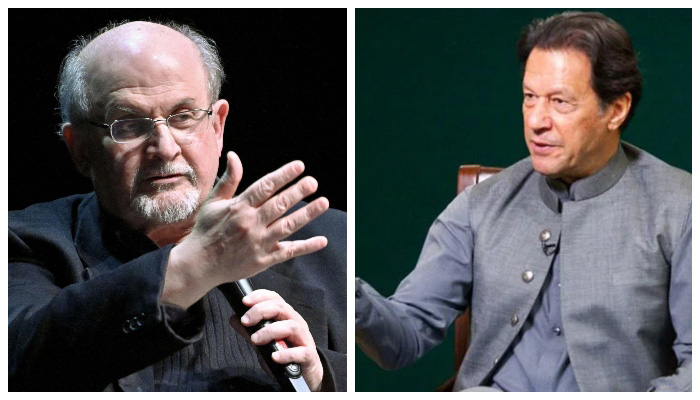Imran condemns attack on Salman Rushdie
Imran Khan describes Salman Rushdie attack as “terrible” and “sad”
WASHINGTON: Pakistan’s former prime minister Imran Khan has condemned the attack on Salman Rushdie, describing it as “terrible” and “sad”, and said that while the anger of the Islamic world at Rushdie’s book The Satanic Verses was understandable, it could not justify the assault, The Guardian reported.
Khan also said he expected Afghan women to “assert their rights” in the face of Taliban restrictions in a Guardian interview in which he sought to moderate his reputation as a firebrand.
He is fighting for his political survival after being ousted from office in April. Khan says his staff and followers are being persecuted and intimidated and he is battling eight-year-old charges of illicit campaign financing that could lead to him being banned from politics.
Ten years ago, Khan pulled out of an event in India because Rushdie would also be appearing and the two men exchanged insults, but Khan does not appear to have expressed support for violent action against the Indian-born author. His denunciation of the attack is striking, however, in a region where most politicians have ducked comment. Asked for his response to the knife attack in New York state that left Rushdie badly wounded, Khan said: “I think it’s terrible, sad. “Rushdie understood that because he came from a Muslim family. He knows the love, respect and reverence of the Holy Prophet (PBUH) that lives in our hearts. He knew that,” Khan said. “So the anger I understood, but you can’t justify what happened.”
A year ago, Khan caused consternation in the west and among many Afghans when he welcomed the Taliban’s seizure of power, saying it was “breaking the chains of slavery”. He defended the Taliban’s treatment of women and girls, describing it as a local “cultural norm” and noting: “Every society’s idea of human rights and women’s rights are different.”
One year on, as women remain excluded from the Afghan workforce and girls over 14 are still banned from attending school, Khan however insisted that change had to come from within Afghanistan. “Eventually Afghan women, the Afghan people, will assert their rights. They are strong people,” he said. “But if you push the Taliban from the outside, knowing their mindset, they will just put up defences. They just hate outside interference.”
-
 Princess Beatrice, Eugenie Are ‘not Innocent’ In Epstein Drama
Princess Beatrice, Eugenie Are ‘not Innocent’ In Epstein Drama -
 Reese Witherspoon Goes 'boss' Mode On 'Legally Blonde' Prequel
Reese Witherspoon Goes 'boss' Mode On 'Legally Blonde' Prequel -
 Chris Hemsworth And Elsa Pataky Open Up About Raising Their Three Children In Australia
Chris Hemsworth And Elsa Pataky Open Up About Raising Their Three Children In Australia -
 Record Set Straight On King Charles’ Reason For Financially Supporting Andrew And Not Harry
Record Set Straight On King Charles’ Reason For Financially Supporting Andrew And Not Harry -
 Michael Douglas Breaks Silence On Jack Nicholson's Constant Teasing
Michael Douglas Breaks Silence On Jack Nicholson's Constant Teasing -
 How Prince Edward Was ‘bullied’ By Brother Andrew Mountbatten Windsor
How Prince Edward Was ‘bullied’ By Brother Andrew Mountbatten Windsor -
 'Kryptonite' Singer Brad Arnold Loses Battle With Cancer
'Kryptonite' Singer Brad Arnold Loses Battle With Cancer -
 Gabourey Sidibe Gets Candid About Balancing Motherhood And Career
Gabourey Sidibe Gets Candid About Balancing Motherhood And Career -
 Katherine Schwarzenegger Shares Sweet Detail From Early Romance Days With Chris Pratt
Katherine Schwarzenegger Shares Sweet Detail From Early Romance Days With Chris Pratt -
 Jennifer Hudson Gets Candid About Kelly Clarkson Calling It Day From Her Show
Jennifer Hudson Gets Candid About Kelly Clarkson Calling It Day From Her Show -
 Princess Diana, Sarah Ferguson Intense Rivalry Laid Bare
Princess Diana, Sarah Ferguson Intense Rivalry Laid Bare -
 Shamed Andrew Was With Jeffrey Epstein Night Of Virginia Giuffre Assault
Shamed Andrew Was With Jeffrey Epstein Night Of Virginia Giuffre Assault -
 Shamed Andrew’s Finances Predicted As King ‘will Not Leave Him Alone’
Shamed Andrew’s Finances Predicted As King ‘will Not Leave Him Alone’ -
 Expert Reveals Sarah Ferguson’s Tendencies After Reckless Behavior Over Eugenie ‘comes Home To Roost’
Expert Reveals Sarah Ferguson’s Tendencies After Reckless Behavior Over Eugenie ‘comes Home To Roost’ -
 Bad Bunny Faces Major Rumour About Personal Life Ahead Of Super Bowl Performance
Bad Bunny Faces Major Rumour About Personal Life Ahead Of Super Bowl Performance -
 Sarah Ferguson’s Links To Jeffrey Epstein Get More Entangled As Expert Talks Of A Testimony Call
Sarah Ferguson’s Links To Jeffrey Epstein Get More Entangled As Expert Talks Of A Testimony Call




